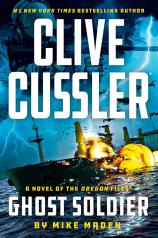Interview: September 5, 2024
In CLIVE CUSSLER GHOST SOLDIER: A Novel of the Oregon Files, the pulse-pounding new adventure in the #1 New York Times bestselling series, Juan Cabrillo and the crew of the Oregon have finally met their match. In this interview conducted by Michael Barson, Senior Publicity Executive at Melville House and Clive Cussler’s primary publicist at G.P. Putnam’s Sons from 1999 to 2015, Mike Maden talks about taking on the Oregon Files series for Cussler's estate and the feedback he has received from fans of these explosive thrillers. He also explains why he thinks some aspects of modern technology are having a negative impact on the publishing industry and, in particular, emerging writers.
Question: Who were the adventure writers you took to when you were in your formative years? And do you still return to any of them today?
Mike Maden: The very first books I ever asked my mother to purchase for me was a nonfiction book on robots and another on rockets and space travel, both of which apparently were the seed beds for my future interest in drone technology. In elementary school, I discovered the joy of ordering Scholastic books and devoured every dinosaur book I could lay my hands on. In junior high, I encountered the great mythologies of the west, as well as classic sci-fi writers like Heinlein and Herbert. But truthfully the “adventure” books I loved most were the nonfiction military histories. It was only later that I began reading fictional adventure. Tom Clancy had the biggest initial influence on me, and Clive Cussler came along after that. Of late, Alan Furst’s novels have completely captured me.
The Oregon Files has such a long and fascinating pedigree that I find myself rereading them every year just for the entertainment value --- they’re just that good. And I always pick one up as I begin my own new Cussler writing to keep me in that adventure mindset.
Q: Before taking on the Oregon Files series for the estate of Clive Cussler, you wrote four books in the Jack Ryan Jr. series begun by Tom Clancy. In what way did preparing yourself for the Clancy series differ from your current preparations for Cussler’s Oregon Files series?
MM: The Clancyverse is more political- and thriller-oriented, whereas the Cusslerverse spans the realm of action and adventure. I thrive in the space where those two worlds converge, relying on my academic and research backgrounds to forge my own unique path.
The primary preparation for both was essentially the same. I had to become completely familiar with the story pedigrees so that I didn’t stumble on previous iterations. But even more important was diving deep into the characters. In the case of the Oregon and its marvelous crew, that took a bit of time because of the larger number of characters in that world. My own theory of story is that a plot is primarily the outcome of characters making strong choices. If you don’t know your characters, you can’t write the story.
Q: As the author of several thrillers of your own over the years, what was the biggest surprise to you in writing these bestselling legacy series?
MM: Writing for an existing franchise is a hugely rewarding experience. Perks include an incredible fan base and a series editor to keep overwatch on everything. Both the Clancy and Cussler franchises offer a moral clarity that cuts through the gloom of our current cultural confusion. I like that. So do my readers.
Q: Leaving aside the question of intellectual property rights, is there any character from 19th- or 20th-century fiction that you’d love to try your hand at casting in a new novel?
MM: In truth, I’d love to take a stab at historical fiction. Most Americans aren’t aware that after the Russian revolution of 1917 and the subsequent civil war, the Soviets developed a massive cavalry army of 20,000 horses and men under the command of the brilliant general Semyon Budyonny. In 1920, that fast-moving army was poised to cut through war-weary western Europe like a hot bayonet through rationed butter, but they were stopped outside the gates of Warsaw by a ragtag army of barefooted Poles under the command of Marshal Józef Piłsudski. That battle is properly known as “The Miracle on the Vistula.” If it weren’t for those Polish patriots, the communists would have swept all the way to Lisbon and changed the course of history for the worse. It’s arguably the greatest battle of the 20th century that nobody knows anything about.
Q: What kind of feedback have you received from fans of Juan Cabrillo in regards to your efforts on these Oregon Files adventures? Did a suggestion ever come in that you decided to implement?
MM: Oregon Files fans are simply the best. The most common feedback I receive is gratitude that I am continuing the series that they so dearly love. It’s impossible to imitate an original voice like Clive Cussler’s. But the readers are very important to me, and I work as hard as I can to deliver a story worthy of the trust they place in me each time they lay their hard-earned cash down on the barrel head.
Q: What do you feel is the most pernicious trend in book selling since the dawn of the new millennium?
MM: At the risk of sounding like the old man on the porch in Bermuda shorts and black socks shouting, “Get off my lawn!”, I think that some aspects of modern technology are hurting the industry and particularly new, talented writers.
Every writer must find their own path up the mountain and should take advantage of every weapon at their disposal, including social media, software and even AI research tools like ChatGPT. What disturbs me is that there is an entire industry of “writers” who are using that technology to simply mimic the intellectual property of real writers. The worst of them are forming little corporations and becoming “book factories.” They deploy AI software to analyze and list the major plot points of successful novels or series. These book factories then generate “new” stories and renamed characters based on that previous analysis, and then run the AI-fabricated product through yet another program that filters out any hint that AI was behind the whole thing.
I’m no lawyer, but technically, with enough changes, the resulting product probably is legally “original.” It’s just not very original nor very good. Imitation may be the greatest form of flattery, but in this case it feels and smells like an ethical diaper load. It is, however, very profitable.
The problem for new writers with real talent is that the new paradigm floods the market with sub-optimal work --- up to a million new books are being e-published each year now, many of them by these “book factories.” So how does a great, new writer break through all the noise of these mediocre works flooding the market? Readers will struggle to find that great new writer when 3,000 ad-sponsored, SEO-optimized e-books crowd the first 100 pages of the search engine or social media platform. (And don’t get me started on fake reviews generated by AI-bots.)
What’s the solution? I’m not against the new technologies per se. But what we need now are talented and trustworthy curators who will cut through the noise and dreck and point readers to quality new works. A few of these curators are emerging. More will come. The industry is changing.
Now you know why I pinch myself when I see my name on the cover of a Clive Cussler Oregon Files novel. Cussler fans know exactly what to expect in terms of story and writing quality, and they’re willing to take a chance on me because they know him. Of course, it’s up to me to deliver the goods.
I suppose we’ll know soon enough if GHOST SOLDIER rises to the standard set by the great captain himself. I sure hope so. I’m having way too much fun hanging out with Juan Cabrillo in the Oregon’s op center chasing down his next adventure.




